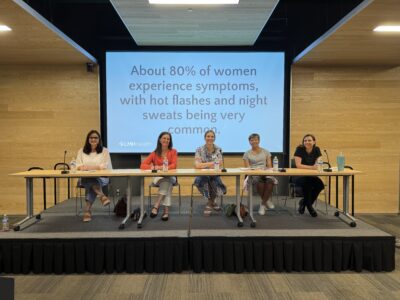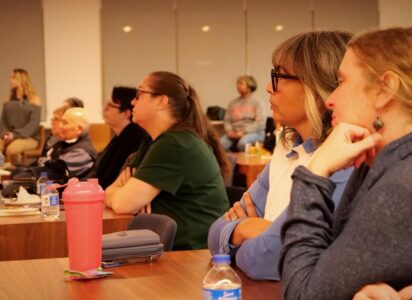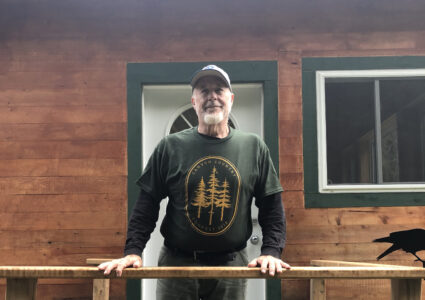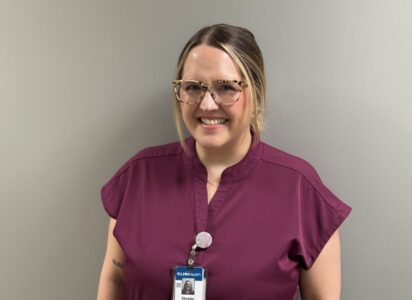Health professionals want to change the conversation about menopause

photo by: Courtesy of LMH Health
From left, Kelly Jimenez, Melissa Hoffman, Dr. Michele Bennett, Jan Morey and Dr. Pamela Huerter participate in a panel discussion about menopause.
Have you heard of the WDNC? The “We Do Not Care Club” is the brainchild of social media creator Melani Sanders, and it speaks to women navigating the waters of perimenopause and menopause. She said the club is for women tired of carrying the emotional load, being polite about pain and tired of pretending to care about things that no longer serve us.
“I didn’t plan to start a movement, I just told my truth and it resonated with millions of women across the world,” she said in a June 17 video. “Through humor, vulnerability and fierce authenticity, I’ve built a space where women can finally exhale.”
Allison Koonce is the community outreach and engagement supervisor at LMH Health. The WDNC videos resonate with her and lit a spark.
“I got really great education about puberty, childbirth and breastfeeding. After that I felt like I was put in a corner and told just to be quiet over there. I wanted to know more about perimenopause and menopause,” she said.
Koonce knew that if she felt that way, there had to be others who wanted more information. Physicians and nurse practitioners at LMH Health were eager to share their expertise and help fill that gap.
LMH Health partnered with the Lawrence Public Library in late June to present What’s the Scoop on Menopause? The panel discussion featured clinicians sharing information and answering questions about menopause.
“We have a lot of resources and support through puberty, birth control, parenting and pregnancy, but I think women don’t know as much about transitioning through this new stage in life,” said Kelly Jimenez, a nurse practitioner with Lawrence OB-GYN Specialists. “I’m really excited about all of the information that’s coming out now.”
Dr. Pamela Huerter, an LMH Health primary care physician, said that conversations around menopause can be tricky.
“Hot flashes are a symptom that everyone knows about,” she said. “The conversations that can be more emotional for women focus on body composition which — although it happens around the time of menopause — isn’t necessarily related to the hormonal changes.”
How do I know if it’s menopause?
Clinical menopause occurs when you’ve gone 12 months without menstrual bleeding, but it’s the lead up — perimenopause — that can be a struggle. You may be in perimenopause if you experience:
l Difficulty sleeping
l Emotional changes, like irritability, mood swings or mild depression
l Hot flashes (a sudden feeling of warmth that spreads over your body)
l Irregular periods
l Night sweats and/or cold flashes
l Vaginal dryness
If you’re using hormonal birth control or have a progesterone IUD, Jimenez said that stops periods for many women, and sometimes even symptoms.
“If you’ve got questions or if you’re having some struggles, we want to talk with you and provide treatment options. We can test your FSH (follicle-stimulating hormone) level and that can indicate if you’ve reached menopause,” she said.
Managing symptoms
The good news is that some people don’t need help managing menopause symptoms. If you do need help managing symptoms that affect your life, there are many safe hormonal and non-hormonal treatments available, including hormone therapy, medications and lifestyle changes.
Dr. Michele Bennett of Lawrence OB-GYN Specialists said that it’s important to tailor the approach for each patient.
“There are a lot of really safe options available, including hormone therapy. It’s definitely not one size fits all,” she said.
But physical symptoms aren’t always the issue. Melissa Hoffman, a psychiatric nurse practitioner at Lawrence OB-GYN Specialists, said that changing hormones can have an effect on the neurotransmitters in our brains, causing emotional and cognitive symptoms that wreak havoc on your life.
“If sleep is causing an issue, maybe we address it first with cognitive behavioral therapy or medication,” she said. “At this phase of life, we’re going through a lot hormonally. We’re also facing a lot of changes as women, mothers, partners and daughters. There’s a lot going on, and both therapy and medication can be options.”
Making healthy lifestyle changes is also important, as the strategies that worked for you earlier in life might not always be as effective. It’s important to evaluate what you’re currently doing and what can improve.
Huerter is certified in culinary medicine and said one key is following a healthy diet.
“A Mediterranean style diet — healthy proteins, healthy fats, lots of produce and whole grains — is always at the top of the list,” she said. “Part of a Mediterranean diet that’s not so great is alcohol, as it can exacerbate hot flashes and sleep disturbance, so be mindful of that component.”
Can I get relief right now?
You may be able to find tips on social media to help manage some of the changes that occur during this stage of life. (That pesky hair that’s sprouting from your chin? It may be time to invest in car tweezers and a magnifying mirror.)
But remember that there’s not a one-size-fits-all approach to managing symptoms. It’s important to be wary of social media influencers and ads trying to sell you products that promise a quick fix.
“Patients will come in and say they saw something on Instagram and they want to get this level checked or that level checked and in reality, it’s not appropriate for their situation,” said Jan Morey, an advanced practice registered nurse at Lawrence OB-GYN Specialists.
When you have questions about what’s happening to your body or about some weird symptom that’s sprung up, talk with your health care provider.
“Make sure you’re having a conversation about your concerns, and that your voice is being heard,” Morey said. “We want to help you make choices that are safe and that will help you navigate this phase of life.”
— Autumn Bishop is the marketing manager and content strategist at LMH Health, which is a sponsor of the Lawrence Journal-World health section.






